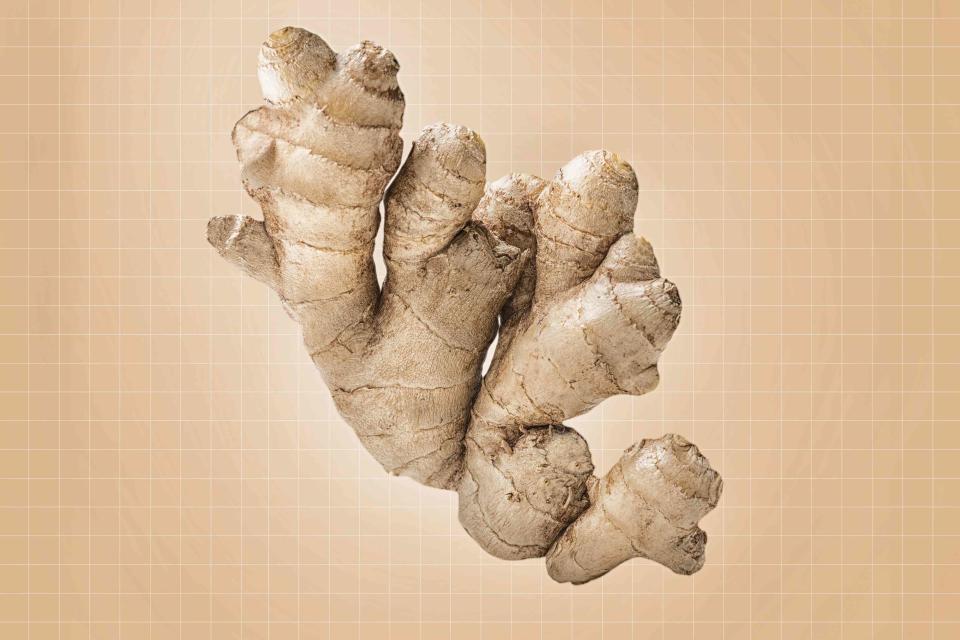If you’re on blood pressure or blood sugar-lowering meds, you’ll want to read this.

Reviewed by Dietitian Maria Laura Haddad-Garcia
Ginger is a versatile ingredient that wears many hats—it is a food, a spice, a flavor enhancer and a medicinal ingredient. This rhizome is known for adding a pungent kick and pleasant aroma to both savory and sweet dishes.
The plant has been used in traditional medicine in many countries for over 3,000 years to treat headaches, nausea, vomiting, menstrual cramps, diarrhea, colds and more. It also has antioxidant and anti-inflammatory properties, and more recent research suggests it may help reduce cholesterol and blood pressure and regulate blood sugar to protect the heart.
Given ginger’s potential power, it’s important to remember that although it’s an herbal remedy, it can interact with certain medications—and knowing what to look out for can help safeguard your health. We contacted experts, including a pharmacist and two registered dietitians, for their insights and recommendations. Here’s what you need to know.
Related: What Happens to Your Body When You Drink Ginger Tea Regularly
4 Medications Ginger Can Interact With
While ginger may have potential health benefits if you take one of the following medications, consult with your health care provider before increasing your intake of ginger or taking a supplement.
1. Blood Thinners
Antioxidant compounds found in ginger (gingerols, shogaol, zingiberene and bisabolene) give it its spice, and they may have blood-thinning properties, too. These compounds may interfere with a substance called thromboxane, says Havy Ngo-Hamilton, Pharm.D., RPh, clinical pharmacist at the University of Minnesota Medical Center. “Thromboxane is produced by the tiny blood cells [called] platelets. In the event of bleeding, thromboxane [triggers the] platelets to clump together to form blood clots at the injury site,” she explains. This substance also reduces blood flow to an injury by constricting blood vessels. However, the risk of bleeding increases because ginger may interfere with thromboxane, disrupting the natural blood clotting process.
In other words, ginger and ginger supplements may have blood-thinning properties and can increase the risk of bleeding when taken alongside blood thinners such as warfarin (Coumadin), aspirin, clopidogrel (Plavix) and rivaroxaban (Xarelto).
Related: Can You Eat Kale If You Take Blood Thinners or Aspirin? Here’s What Health Experts Say
2. Diabetes Medications
Ginger has been reported to lower fasting blood sugar levels and improve insulin sensitivity and A1C levels in people with type 2 diabetes. That’s great news! But if you are already on blood sugar-lowering medications, such as metformin and insulin, adding ginger may further lower your levels. Why is this? Compounds present in ginger may interfere with enzymes responsible for breaking down carbohydrates, which can exacerbate the impact of diabetes medication, says Ngo-Hamilton. When consumed in excess, ginger may contribute to hypoglycemia or low blood sugar.
3. Antiarrhythmic Medications
Ngo-Hamilton says that if you have an arrhythmia—or an abnormal heartbeat—ginger may also interact with antiarrhythmic medication, such as amiodarone (Pacerone, Cordarone).
Your heart cells have calcium channels that support the heart’s ability to contract. The compounds present in ginger may block calcium from entering the cardiac cells, potentially lowering blood pressure.
4. Blood Pressure Medications
Ginger may enhance the effectiveness of blood pressure medications. It can potentially interfere with angiotensin, a hormone that regulates blood pressure and fluid levels in the body. In the long term, this can relax blood vessels, leading to low blood pressure.
Effects of Ginger on Medication Absorption
In addition to interacting with the medications above, ginger may amplify the effects of medications when taken together. So, if you eat ginger or take ginger supplements alongside medication and experience side effects, such as sweating, shaking, nervousness, anxiety and dizziness, seek out medical help immediately.
How Much Ginger Is Safe Per Day?
Eating foods containing small amounts of ginger is generally safe and unlikely to cause significant drug interactions, according to Michele Routhenstein, M.S., RD, CDCES, a preventive cardiology dietitian at EntirelyNourished. Unless you have an underlying health condition, eating natural ginger root up to 4 grams daily is considered safe. “This amount is equivalent to 2 teaspoons of powdered ginger or 4 teaspoons of grated raw ginger,” says Routhenstein.
However, consuming large amounts of ginger root can irritate your GI system, causing nausea, cramps, bloating, diarrhea, heartburn and mouth or throat irritation, says Ngo-Hamilton.
It’s best to consume natural ginger in moderation, such as pairing it with sushi or a poke bowl or using powdered ginger in recipes, recommends Megan Huff, RDN, a clinical dietitian at Piedmont Healthcare. Speaking with a registered dietitian about food options and ginger alternatives can help you determine if you need to reduce the amount of ginger consumption in your meals. And if you are taking the medications above, you’ll also want to consult with your doctor about how much is right for you, especially if you’re looking to supplement. “Every individual may have a different dosage, depending on their health status and medications,” says Huff.
Who Should Avoid Ginger Supplements?
People with the following conditions should avoid ginger supplements:
-
You have a ginger allergy or sensitivity: If you’re allergic to ginger, have a sensitive stomach or a history of digestive issues, avoid ginger supplements.
-
You have a bleeding disorder: Because ginger has blood-thinning properties, talk to your doctor if you have a bleeding disorder or are taking blood-thinning medication.
-
You’re having surgery: Since certain dietary supplements, such as ginger, may interact with anesthesia and medications used before, during and after the procedure, people may be advised by their doctor to stop taking ginger supplements two to three weeks prior to their scheduled surgery.
-
Children: Unless recommended and under the supervision of a medical doctor, ginger supplements aren’t recommended for children due to limited research on their safety and effectiveness in young people.
The Bottom Line
Ginger is a traditional culinary and medicinal ingredient across many cultures. Cooking with ginger is generally safe. However, ginger contains compounds that may interact with certain medications, such as blood thinners and blood sugar- and blood pressure-lowering medications. Before taking ginger supplements as part of your routine, discuss with your doctor the potential interactions that ginger may have with your medications to lower the risk of side effects. In addition, reach out to a registered dietitian to explore ways to incorporate a safe amount of ginger into your dishes.
Related: 4 Ways Caffeine Can Impact Your Medications, According to Dietitians
Read the original article on Eating Well.
Source Agencies

